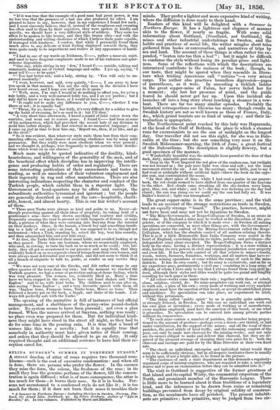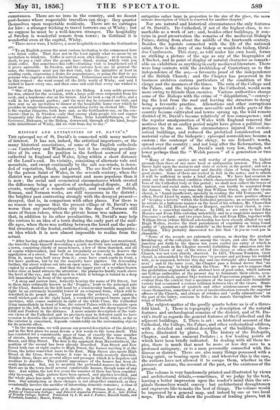szLnis BUNBITRY'S SUMMER IN NORTHERN EUROPE. * A arziGLE drachm of
attar of roses requires two thousand rose- blooms—such is the cost of excessive condensation: and when all is done, there are persons who prefer the flower. In the essence they miss the form, the colour, the freshness of the rose ; in its smell they lose the genuine perfume of the flower, till the concen- tration is again diffused ; what is of more consequence, the attar is too much for them—it burns their nose. So it is in books. Per- sons not accustomed to a condensed style do not like it ; it is too much for them; if it does not burn their noses it troubles their A Summer its Northern Europe; • including Sketches in Sweden, Norway, Fin- land, the Aland Isles, Gothland,S•c. By Selina Banbury, Author of " Life is • avedes," dc. In two volumes. Published by Hurst andBlackett.
minds. They prefer a lighter and more expansive kind of writing, where the diffusion is done ready to their hand.
Readers of this kind will be delighted with a Summer in Northern Europe. It has a lightness and elegance of manner akin to the flower, if nearly as fragile. With some solid information about Gottland, (Gooclland, not Gothland,) the mines and other industrial undertakings in Sweden, and the habits and practices of social life, the writer mingles short tales gathered from books or conversation and narratives of trips by sea and land. The account of these things is often rather too ex- panded, "beaten into too thin a leaf " ; but it might be difficult to condense the style without losing its peculiar grace and. light- ness. Some of the reflections with which the descriptions are intermixed 'contribute to the raciness of the book ; though, to our taste, they might be spared when they resemble in liters- tare what trading Americans call "notions "—a very mixed cargo. The author also practises boundless digression—pages of parentheses, as it were. In ascending a ticklish ladder in the great copper-mine of Falun, her nerve failed her for a moment ; she lost her presence of mind, and the guide
• feared. he should never get her up. Upon this incident she launches off into a long story about reaching a steamer in a row- boat. There are far too many similar episodes. Probably the historical retrospections are likewise too many ; though events in Swedish history are not so well known as those of France, Italy, &c. which grand tourists are so fond of using up ; and their in- troduction is appropriate. The Northernmost point reached by this lady was Haparanda, at the head of the Gulf of Bothnia, the place to which a steamer runs for excursionists to see the sun at midnight on the longest day. Our traveller did not see this sight, for she was in Dale- • carlia at the time ; but she saw something very near it on the Swedish Midsummer-morning, the 24th of June, a great festival of the Dalecarlians. The description is slightly flowery, but a good specimen of the manner.
Wonderfully beautiful was the midnight hour passed at the door of that dark, dirty., miserable post-station. "Deep in the West lingered the red glow of the sunken sun, but twilight was not around us ; the pale pure light was clear and soft ; not the least movement stirred the air. I sat in the carriage read a little, just to say I had read at midnight without artificial light—threw the book on the oppo- site seat, and contemplated the scene.
"In that short space of time, while I had read a psalm in our prayer- book, the red clouds seemed to have shifted from one quarter of the heavens to the other. Red clouds came streaking all the sky-broken wavy lines, grey., blue red, and white ; and lo !—the day was dawning ere the day had closed ; the sun was rising ere we could say the sun had fully set. It was Balder's festival ; light was triumphant."
The great copper-mine is in the same province ; and the visit leads to an account of the strange restrictions on trade in Sweden, snd an equally strange "board?' The practice, however, might not have been and may not yet be injurious to Sweden.
• " The Mine-Government, or Bergs-Collegium of Sweden, is an estate in the realm. In England a mine may be worked at the discretion of the pro- prietor, or of the company to which it is made over : in Sweden all mining operations are connected, as most other things are, with the Government ; but placed under the control of the Mining-Government called the Bergs- Collegium, which has the absolute control of all matters relating thereto. This is as if a little Honourable East India Company were seated in the heart of England, exercising therein its rights, powers, and privileges—the independent army alone excepted. The Bergs-Collegium forms a distinct body m the state, having a distinct representation : it is a state within a state, having its own powers in civil and criminal jurisdiction over property and even life. It has the sole control of all that relates to mines—fossils, woods, waters, furnaces, foundries, workings, and all matters that have re- lations to mining operations or come within the range of such in the mine districts. It has its own courts ; but its army is exclusively, and asS far as my experience goes, preeminently a civil one ; consisting in a long array of officials, of whom I have only to say that I always found them Very civil in- deed, although their styles and titles would be quite too grand and lengthy sounding for such pages as these. "All colour-works come under their rule ; together with those of cobalt, alum, sulphur, vitriol, &c. No mine-proprietor can work out, or attempt to work out, a plan of his own ; every mode of working and every machine employed must lave the sanction of this board, or accept its established plans and machines. No speculation can take place, no experiment be tried, without this permission. "The thing called public spirit' by us is generally quite unknown, or strongly fettered, in Sweden. In this case no individual can work out his own plan or invention ; every mode of working or of manufacture, every machine employed, must have the sanction of this board, or use what it prescribes. No speculation can be entered into among private parties without its concurrence.
"To each mine-canton a number of parishes, the number being propor- tioned to the amount of produce—perhaps even a dozen—are thirled, or laid under contribution, for the support of the mines ; and all the wood of these parishes, the great article of local traffic, and the redeeming comfort of the poor, can only be made into charcoal for the mining-works ; and not only are its owners obliged to make and deliver this charcoal, but they are de- prived of the pleasant revenge of charging their own price for it : both the charcoal and carriage are paid for by the Mine Directors at their own fixed rate.
"The check on individual enterprise and individual talent would thus seem to be sufficiently' obvious; but in all despotic institutes there is usually a bright spot, if not a bright side, to be found in the picture.
"The existence of such a state department as this demands a regularly- organized corps of mining-engineers, who are required to take a university degree and to pass an examination before they can be admitted into it."
The visit to Gottland. is suggestive of the former greatness of that island and its capital Wisby, the commercial emporium of the North, and prominent member of the Hanseatic League. There is little more to be learned about it than traditions of a legendary kind, and. the inferences to be drawn from ruins or remaining buildings prevented from decay by original solidity of construc- tion, as the muniments have all perished. The present inhabit- ants are primitive; how primitive, may be judged from two oir-
cumstances. There are no inns in the country, and no decent post-houses where respectable travellers can sleep : they quarter themselves upon respectable residents. There are no carriages for hire : a stranger wishing to travel borrows one at Wisby ; but we suppose he must be a well-known stranger. The hospitality of Sweden is wonderful remote from towns; in Gottland it is wonderful even at the capital, Wisby.
"There never were, I believe, a more hospitable race than the Gottlandera are.
"To an English person the most curious invitation is the commonest here —to drink coffee. That does not in the least signify what we mean by an invitation to drink tea. Coffee is served soon after dinner ; so it means, in short, to pay a visit after the people have dined, during which visit you drink coffee. But sometimes this coffee-drinking visit is lengthened out if it prove agreeable. In Sweden, and the customs here are in general the same the stranger must pay the first visit, take the initiative at least in sending cards, expressing a desire for acquaintance, or going the first to see persons who express a similar inclination. Friherianan saved me all trouble in this respect : she went round all the little world of Wisby, and said I wished to know every one, and then came and said that every one wished to know me.
"One of the first visits I paid was to the Bishop. A very noble presence his was, attired for the occasion' with a large gold cross suspended from his neck, and a handsome star on his breast. And we took a cup of coffee, and a walk in his pleasant garden ; and the next day he returned our visit, and then sent us an invitation to dinner at the hospitable home over which he presides in single-blessedness,—an astonishing rarity in clerical life. This is the regular etiquette, both here and, as the Gottlanders say, on the con- tinent—that is, in Sweden—only that among plain people tea and supper frequently take the place of dinner. Thus, from Landshbfningen, or the Governor Biskopen or the Bishop, downward, through all the kind, hospi- table inhabitants '
bitants ofWisby, did we visit from day to day."



























 Previous page
Previous page